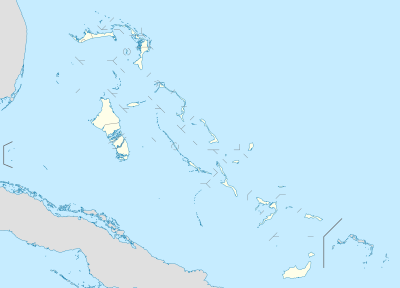The Bluff, Bahamas
The Bluff is a settlement on North Eleuthera, Bahamas.
The Bluff | |
|---|---|
 The Bluff | |
| Coordinates: 25°28′N 76°46′W | |
| Country | |
| Island | North Eleuthera |
| Time zone | UTC-5 (Eastern Time Zone) |
South Andros
There are three settlements in the Bahamas called "The Bluff". The first is on South Andros Island. It is the most densely populated settlement on the island. It hosts a Homecoming every year, the first weekend in June on its Regatta site. Also, the Bluff is home to the 'Government' buildings like the police station, the Post Office and BaTelCo.
North Eleuthera
The other settlement called "The Bluff" (or simply "Bluff") is on the west coast of North Eleuthera Island.
In 1783, after he had served with the Pennsylvania Loyalists and the Carolina Rangers, James Kelly (1754-1808), cited as entering the Bahamas via East Florida and accompanied by Hugh Kelly was awarded 500 acres in the vicinity of Bluff, Eleuthera. James Kelly married first Susan Turner then Elizabeth Kemp and had a plantation at Bluff. A plantation house may have been built but the location of its remains is unknown.
It seems likely that the Kellys left Bluff. Indeed historic records of Kelly descendants are found at Current, Harbour Island, Nassau all in the Bahamas and Key West, Florida. Records for Kellys of African ancestry, presumably former slaves are also found in the vicinity.
History says the settlement was established by emancipated slaves somewhere around 1807/8. By 1849 it exported pineapples and citrus fruit.[1] Louis Diston Powles visited Eleuthera, and in his book The Land of the Pearl (1888) referred to the Bluff settlement and its black residents, most notably John Neely, the tacitly accepted leader of the settlement.
The third settlement is on Cat Island.
At the National Archives in Nassau, Bahamas, there exists a will from one Christopher Neely, a white slaveholder (a British loyalist originally from South Carolina in the colonies). In his 1807 will he makes specific references to his slaves on Abaco and New Providence Islands. In this will he states that it is his desire that his 24 slaves on Abaco Island be freed upon his death, which came within several months of his will. Possibly this settlement was established by these freed slaves from Abaco Island. The (Eleuthera) Bluff settlement sponsors an annual homecoming event the second weekend of July which generally coincides with the Independence Day celebrations taking place throughout the entire Bahamas.
Notes
- Craton, Michael; Saunders, Gail (2000). A History of the Bahamian People: From the Ending of Slavery to the Twenty-First Century. University of Georgia Press. p. 146. ISBN 978-0-8203-2284-1.